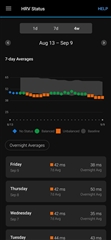I have a 255 that I got in July. Long story short, it says my 7d HRV average is below my baseline almost every single day! How can my HRV be below "normal" for me 80% of the time? Doesn't that mean that the definition of "normal" is messed up? I'll attach screenshots and a spreadsheet here. These first 4 are the images since I got the watch 3+ months ago. The spreadsheet has the actual overnight HRV for each day, with some comments.




You can see that right when I got the watch my HRV was a bit higher for the first few days, but then it came down a lot. At the end of 19 days, it gave me my first baseline of 47-67. But in the first 19 days, my AVERAGE was 50.5, and 7 of the 19 nights were below 47! Why would it calculate a baseline that barely covered my average and put nearly half of my points as "too low"?
As the weeks have gone by, it has been sneaking my baseline range down, but VERY little and VERY slowly. Today, my baseline is 39-55, but my average over the last 21 days is BELOW that at 38.4, and 15 of the last 21 days have been below 39. Just looking at that last image (which covers 4 weeks), don't you think the grey band should center on the long line of dots?
There have been periods in here where I have been on vacation, and taking multiple rest days, so I am CLEARLY not stressed this much. If anything, seeing a horrible HRV assessment every morning is adding to my stress!!
How long will it take to re-equilibrate, or can I force it to start a new 21 day count from scratch?


